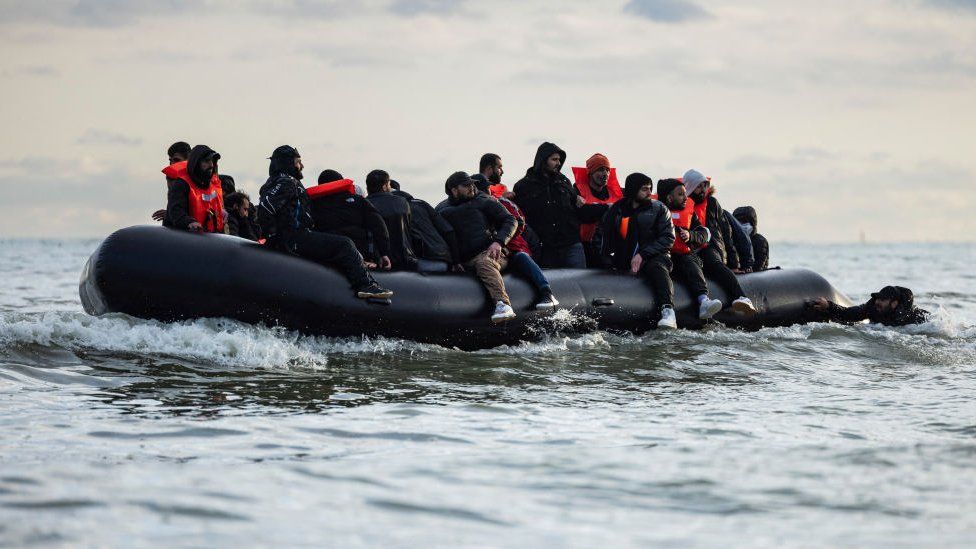Rwanda plan: Irish government wants to send asylum seekers back to UK
- Published

The Taoiseach (Irish prime minister) Simon Harris has asked Ireland's justice minister to bring legislation to cabinet to enable asylum seekers to be sent back to the UK.
Helen McEntee has revealed that 80% of recent arrivals to the Republic came from the UK across the Irish border.
Tánaiste (deputy prime minister) Micheál Martin said the UK's Rwanda policy was already impacting Ireland.
Legislation to revive the UK's Rwanda policy became law on Thursday.
It aims to deter people from crossing the English Channel by sending some asylum seekers to the central African country.
No migrants have been sent yet from the UK.
The UK government had hoped for flights to take off by the spring but Prime Minister Rishi Sunak says this should now happen within 10 to 12 weeks.
A spokesman for Mr Harris said the taoiseach had asked Ms McEntee "to bring proposals to Cabinet next week to amend existing law regarding the designation of safe 'third countries' and allowing the return of inadmissible international protection applicants to the UK", Irish broadcaster RTÉ reported on Saturday.
Speaking on RTÉ's Six One News, Ms McEntee said: "There are many reasons why we have seen an increase in migration toward Ireland.
"What's clear in the decision that the UK have taken in choosing Brexit, they have actually seen an increase in people seeking asylum in their country. The way that they deal with that, it's their policy.
"My focus as minister for justice is making sure that we have an effective immigration structure and system.
"That's why I'm introducing fast processing. That's why I'll have emergency legislation at cabinet this week to make sure that we can effectively return people to the UK and that's why I'll be meeting with the Home Secretary [James Cleverly] to raise these issues on Monday."
A spokesman for the Irish Department of Justice told BBC News NI that "the issue of irregular movement within the CTA" - the Common Travel Area between Britain and Ireland - would be discussed at the ministers' meeting.
'Fearful'
Earlier in the week, Ms McEntee told a committee of the Oireachtas (Irish Parliament) there had been a rise in the number of people crossing the land border between Northern Ireland and the Republic, with this now making up 80% of the total number of asylum seekers.
In response to her comments, Mr Martin said the UK government's Rwanda policy meant people were "fearful" of staying in the UK and were crossing the border to the Republic so they would not be sent to Rwanda. Mr Martin, who also serves as Ireland's foreign minister, has spoken of his opposition to the policy.
Speaking to Sky News's Trevor Phillips, Prime Minister Rishi Sunak was asked whether Mr Martin's comments showed the UK was "exporting the problem".
Mr Sunak replied: "The deterrent is - according to your comment - already having an impact, because people are worried about coming here and that demonstrates exactly what I'm saying: if people come to our country illegally, but know that they won't be able to stay, they're much less likely to come."
His comments follow reports that around 350 migrants crossed the Channel to England in small boats yesterday. The French authorities rescued a further 99 people in three boats who had got in difficulty at sea.
Mr Sunak told Sky News that illegal migration as a "global problem" and said many countries were looking to replicate "third-country partnerships" similar to the agreement struck between the UK and Rwanda.
A No 10 spokesperson said it was "too early to jump to specific conclusions about the impact of the Act and treaty in terms of migrant behaviour" following Mr Martin's comments.
The Safety of Rwanda Act, which aims to avoid further legal challenges to the policy by declaring Rwanda a safe country, was approved by MPs and peers this week and passed into law on Thursday.
However, the plan could still be held up by court challenges.
- Published1 day ago
- Published5 days ago
- Published5 days ago
- Published5 days ago